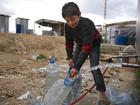Untapped groundwater resources have "vast potential," the U.N.'s cultural agency said Monday, potentially alleviating demand for ever-scarcer water supplies across the world.
 Full Story
Full Story
Nearly 200 nations gathered Monday to grapple with a question that will outlive Covid-19 and Russia's invasion of Ukraine: how does a world addicted to fossil fuels prevent carbon pollution from making Earth unlivable?
 Full Story
Full Story
Residents of the northern Ukrainian town of Novoselytsya were told Monday to temporarily take shelter after an ammonia leak at a nearby chemical factory, amid intense fighting with Russian forces in the area.
 Full Story
Full Story
California's urban water users and farmers who rely on supplies from state reservoirs will get less than planned this year as fears of a third consecutive dry year become reality, state officials said.
Water agencies that serve 27 million people and 750,000 acres (303,514 hectares) of farmland, will get just 5% of what they've requested this year from state supplies beyond what's needed for critical activities such as drinking and bathing.
 Full Story
Full Story
It was so hot in Kuwait last summer that birds dropped dead from the sky.
Sea horses boiled to death in the bay. Dead clams coated the rocks, their shells popped open like they'd been steamed.
 Full Story
Full Story
Italian scientists are racing against time to study, scan and sample Europe's southernmost glacier before it melts and disappears as a result of rising global temperatures.
Researchers conducted a preliminary radar survey of the Calderone glacier in Italy's central Apennine Mountains on March 13 and plan to return next month to drill into it and take samples. The aim is to extract chunks of the glacier and store them in Antarctica for future study.
 Full Story
Full Story
Residents in Fukushima and Miyagi were cleaning their homes after a sleepless night following a powerful 7.4-magnitude earthquake that struck off the northern Japanese coasts, smashing furniture, knocking out power and killing four people.
The region is part of an area devastated by a deadly 9.0 quake and tsunami 11 years ago that caused nuclear reactor meltdowns, spewing massive radiation that still makes some parts uninhabitable.
 Full Story
Full Story
A powerful 7.3-magnitude quake jolted eastern Japan on Wednesday night, rattling the capital Tokyo and prompting a tsunami advisory for parts of the northeast coast, the Japan Meteorological Agency said.
 Full Story
Full Story
Four Bengal tigers rescued from years of captivity in a train carriage in Argentina have been released into open-air enclosures in South Africa.
After a journey of more than 70 hours from Argentina, the tigers stepped from their crates into open-air enclosures at the Lionsrock Big Cat Sanctuary in South Africa's central Free State province.
 Full Story
Full Story
A senior German official predicted Tuesday that the war in Ukraine and its impact on fossil fuel prices worldwide will provide a "massive boost" for the means and measures needed to curb climate change.
Patrick Graichen, Germany's deputy energy and climate minister, said rising global prices for oil, gas and coal will accelerate the uptake of low-emission technology that simultaneously reduces countries' reliance on imports from Russia.
 Full Story
Full Story



